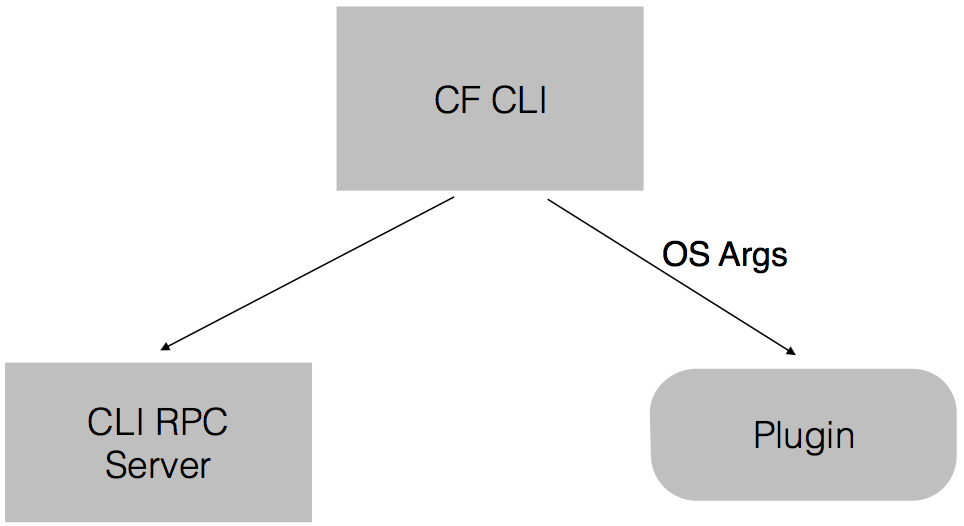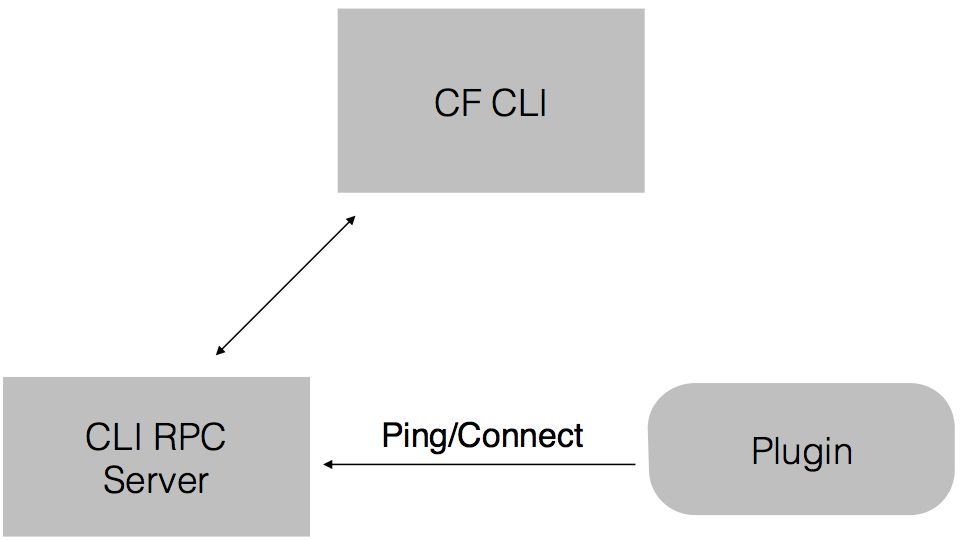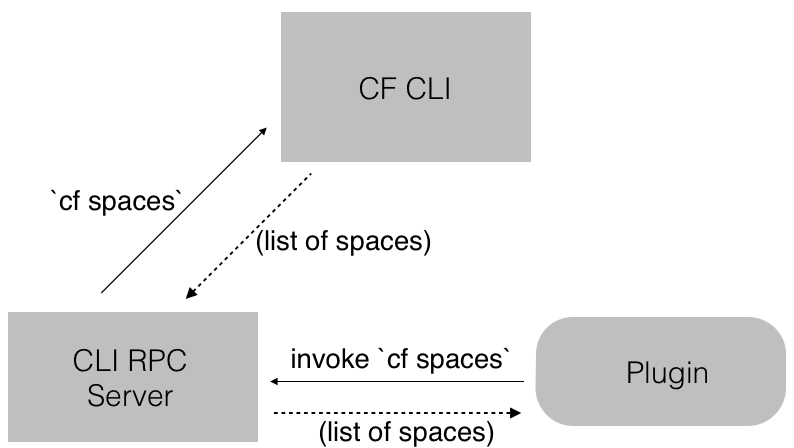If you have any questions about developing a CLI plugin, ask away on the cf-dev mailing list (many plugin developers there!) or the #cli channel in our Slack community.
Future updates to the architecture
Our current plugin architecture currently requires a review and possible large overhaul. Until then, there are no current plans to update our existing architecture. Feel free to provide input here where you can provide feedback.
Changes in v6.25.0
GetApp now returns Path and Port information.
Changes in v6.24.0
- API
LoggregatorEndpoint() is deprecated and now always returns the empty string. Use DopplerEndpoint() instead to obtain logs.
Changes in v6.17.0
-v is now a global flag to enable verbose logging of API calls, equivalent to CF_TRACE=true. This means that the -v flag will no longer be passed to plugins.
Changes in v6.14.0
- API
AccessToken() now provides a refreshed o-auth token.
- Examples on how to use fake
CliConnection and test RPC server for TDD development.
- Fix Plugin API file descriptors leakage.
- Fix bug where some CLI versions does not respect
PluginMetadata.MinCliVersion.
- The field
PackageUpdatedAt returned by GetApp() API is now populated.
Complete change log ...
Developing a Plugin
Go here for documentation of the plugin API
This README discusses how to develop a cf CLI plugin.
For user-focused documentation, see Using the cf CLI.
*If you wish to share your plugin with the community, see here for plugin submission.
Development Requirements
- GoLang installed
- Tagged version of CLI release source code that supports plugins; cf CLI v.6.7.0 and above
mkdir -p "${GOPATH}/src/code.cloudfoundry.org"
cd "${GOPATH}/src/code.cloudfoundry.org"
git clone "https://github.com/cloudfoundry/cli"
(Optionally specify --depth 1 to git clone for a faster download without any commit history)
Architecture Overview
The cf CLI plugin architecture model follows the remote procedure call (RPC) model.
The cf CLI invokes each plugin, runs it as an independent executable, and handles all start, stop, and clean up tasks for plugin executable resources.
Here is an illustration of the work flow when a plugin command is being invoked.
1: CLI launches 2 processes, the rpc server and the independent plugin executable

2: Plugin establishes a connection to the RPC server, the connection is used to invoke core cli commands.

3: When a plugin invokes a cli command, it talks to the rpc server, and the rpc server interacts with cf cli to perform the command. The result is passed back to the plugin through the rpc server.

- Plugins that you develop for the cf CLI must conform to a predefined plugin interface that we discuss below.
Writing a Plugin
Go here for documentation of the plugin API
To write a plugin for the cf CLI, implement the predefined plugin interface.
The interface uses a Run(...) method as the main entry point between the CLI and a plugin. This method receives the following arguments:
- A struct
plugin.CliConnection that contains methods for invoking cf CLI commands
- A string array that contains the arguments passed from the
cf process
The GetMetadata() function informs the CLI of the name of a plugin, plugin version (optional), minimum CLI version required (optional), the commands it implements, and help text for each command that users can display with cf help.
Plugin names with spaces must be enclosed in quotes when installed and uninstalled (e.g.: cf install-plugin "my plugin"). We recommend that plugin names not contain spaces to prevent the command shell from interpreting the name as multiple words.
To initialize a plugin, call plugin.Start(new(MyPluginStruct)) from within the main() method of your plugin. The plugin.Start(...) function requires a new reference to the struct that implements the defined interface.
This repo contains a basic plugin example here.
To see more examples, go here.
Uninstalling A Plugin
Uninstall of the plugin needs to be explicitly handled. When a user calls the cf uninstall-plugin command, CLI notifies the plugin via a call with CLI-MESSAGE-UNINSTALL as the first item in []args from within the plugin's Run(...) method.
Test Driven Development (TDD)
An example which was developed using TDD is available:
Test RPC server: an RPC server to be used as a back-end for the plugin. It allows the plugin to be tested as a stand alone binary without replying on CLI as a back-end. See example
Using Command Line Arguments
The Run(...) method accepts the command line arguments and flags that you define for a plugin.
See the [command line arguments example] (https://github.com/cloudfoundry/cli/blob/master/plugin/plugin_examples/echo.go) included in this repo.
Global Flags
There are several global flags that will not be passed to the plugin. These are:
-v: equivalent to CF_TRACE=true, will display any API calls/responses to the user-h: will process the return from the plugin's GetMetadata function to produce a help display
Calling CLI Commands
You can invoke CLI commands with cliConnection.CliCommand([]args) from within a plugin's Run(...) method. The Run(...) method receives the cliConnection as its first argument.
The cliConnection.CliCommand([]args) returns the output printed by the command and an error. The output is returned as a slice of strings. The error will be present if the call to the CLI command fails.
See the test plugin example included in this repo.
Creating Interactive Plugins
Because a plugin has access to stdin during a call to the Run(...) method, you can create interactive plugins. See the interactive plugin example included in this repo.
Creating Plugins with multiple commands
A single plugin binary can have more than one command, and each command can have it's own help text defined. For an example of multi-command plugins, see the multiple commands example
Enforcing a minimum CLI version required for the plugin.
func (c *cmd) GetMetadata() plugin.PluginMetadata {
return plugin.PluginMetadata{
Name: "Test1",
MinCliVersion: plugin.VersionType{
Major: 6,
Minor: 12,
Build: 0,
},
}
}
Debugging plugin code
The recommended approach to debugging plugin code is to print to stdout, or set CF_TRACE to /dev/stderr or a file.
Compiling Plugin Source Code
The cf CLI requires an executable file to install the plugin. You must compile the source code with the go build command before distributing the plugin, or instruct your users to compile the plugin source code before installing the plugin. For information about compiling Go source code, see Compile packages and dependencies.
Using Plugins
After you compile a plugin, use the following commands to install and manage the plugin.
Installing Plugins
To install a plugin, run:
cf install-plugin PATH_TO_PLUGIN_BINARY
Listing Plugins
To display a list of installed plugins and the commands available from each plugin, run:
cf plugins
Uninstalling Plugins
To remove a plugin, run:
cf uninstall-plugin PLUGIN_NAME
Known Issues
- When invoking a CLI command using
cliConnection.CliCommand([]args) a plugin will not receive output generated by the cli package. This includes usage failures when executing a cli command, cf help, or cli SOME-COMMAND -h.
- When invoking a CLI command using
cliConnection.CliCommand([]args) and CF_TRACE=true/cf -v a plugin will receive all the output, including the trace in the returned string array. This may cause problem while trying to debug output with CF_TRACE. As work around, if a plugin is running cf curl via CliCommand, the following can be used to help with debugging (when the CF_DEBUG_CURL=true):
func RunCurl(cliConnection plugin.CliConnection, args []string) ([]string, error) {
output, err := cliConnection.CliCommand("curl", args...)
if os.Getenv("CF_DEBUG_CURL") == "true" {
fmt.Println(strings.Join(output, "\n"))
}
return output, err
}
-
Due to architectural limitations, calling CLI core commands is not concurrency-safe. The correct execution of concurrent commands is not guaranteed. An architecture restructuring is in the works to fix this in the near future.
-
Due to our legacy code, the plugin architecture does not currently work with newer CLI features. See a more verbose explanation here.
-
Due to our legacy code, when you CF_TRACE=true, the refresh_token in the request body is not sanitized.
 Documentation
¶
Documentation
¶
 Directories
¶
Directories
¶


